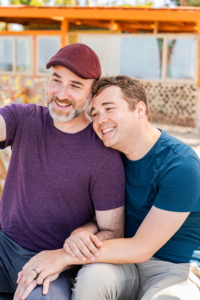Counting the Omer, counting each of the 49 days from the second day of Passover to the holiday of Shavuot, is an opportunity for inspiration, self-improvement and giving back.
While it’s easy to lose track of passing days during social isolation and endlessly monitoring the news, during the Omer we account for each day with personal meaning and purpose, helping us grow and improve – something we might crave in this crisis.
We begin in the first week reflecting on chesed, loving kindness, caring. In Jewish tradition, acts of loving kindness include visiting the sick, fulfilling basic needs for the vulnerable, being welcoming. We are meant to pursue them without questioning the amount, our ability, whether it’s right, or if we might also benefit.
Looking over the list of recommended deeds, they appear obvious but we tend not to fulfill them as often as we should. Why do we need to command people to engage in these simple, beneficial acts?
Even under normal circumstances when it isn’t extremely risky to visit the sick, it’s easy to shy away from supporting those facing illness. Perhaps it’s out of fear of witnessing the effects of illness, and what will happen to us when we get sick. It might be that we fear saying the wrong thing or that the person does not care to see us.
We can make acts of loving kindness more achievable using the other traits we unpack during the Omer. During this time of physical distancing, how can we care for those who are ill while still protecting ourselves and following public safety guidelines?
Here are actions we can take now that will also guide us to confidently attend to the sick beyond the pandemic:
- Call one or two people at higher risk or someone who’s waiting for a test result. Write yourself questions in advance, such as how they’re feeling, how their lives have changed, what they look forward to.
- Consider the ripple effects of checking in: how your call might inspire the recipient’s actions, or how telling someone about your experience making a call might spark an idea for their own outreach.
- Bring compassion rather than judgment to someone who’s sick. How they got sick or if they may have unknowingly spread the disease does not lessen how their illness impacts them or their lives.
- Rather than put off the contact, set aside time for it. Make it the most important task of the day, and create something for yourself to look forward to because of it – something special you will write, a unique message you crafted just for that person.
As we count the coming days and weeks, we will consider these six other themes:
Week 2, Gevurah: Strength, discipline, power
Week 3, Tiferet: Beauty, compassion
Week 4, Netzach: Endurance, efficiency
Week 5, Hod: Humility
Week 6, Yesod: Foundation, grounding, commitment
Week 7, Malchut: Nobility, majesty
Today we count the fourth day of the Omer.
News stories share feats of inner strength from frontline healthcare professionals, scientists working on vaccines and cures, and essential workers who ensure people’s basic needs are fulfilled. Yet, there are many others who step up to extend a hand out of the spotlight. They buy groceries for at-risk neighbors, make calls to isolated individuals, donate to ensure a family can buy food for a week. All of these acts, splashy or quiet, helping many or just one, are adding up to impact millions of lives.
In this second week of the Omer, we focus on gevurah, our strength, power, discipline. But this is not about raw strength or wielding power. Gevurah is a grounded fortitude that comes with using judgment and knowing limits. In gevurah, we especially recognize that small gestures have immense power to do good. This even applies to our mundane decisions, which seem to have much higher stakes these days.
When to leave the house, whether to cook or order in, how much news to consume, to buy toilet paper this shopping trip? Add to these the new choices we have faced: when to stop seeing loved ones in person, whether to outsource childcare, how to support local business, nonprofits, and people in need. Weighing heaviest are unexpected decisions around conserving resources, seeking healthcare, sustaining organizations, and more.
These everyday decisions feel so consequential because they could preserve medical resources and save lives. We are confronted with the fact that even our minor choices affect others as much as they do ourselves.
Making all of these decisions, though exhausting, employs and tests our judgment, building resilience and experience. To navigate uncertainty, relying on moral boundaries and facts feeds our conviction and empowerment.
Yom Hashoah, Israel’s Holocaust Remembrance Day, falls during this week. As it happens, the full name in Hebrew is Yom Hazikaron laShoah ve-laGevurah (Holocaust and Heroism Remembrance Day). The chosen date for Yom Hashoah is the anniversary of the Warsaw Ghetto Uprising, a symbol of utmost strength and will to survive.
This uprising was one of the largest resistance efforts during the Holocaust. But commemorating this event also honors the countless smaller struggles and schemes to save even one life, and many did ensure people survived. People shared their scarce food so others would not starve, snuck supplies to those in captivity, found jobs for prisoners in the camps, and risked their own lives to hide people and belongings. We recognize the gevurah, tenacious efforts across the spectrum from so many to protect themselves and others, even as we mourn devastating loss on Yom Hashoah.
From this ultimate example of gevurah, we grasp the mightiness in millions of people’s calculated actions – great and small – to do what was right. We can translate it to the potential power of our daily decisions now. We hope that making tough choices, all-consuming and even trivial, will make us more resilient and pave the way to a more secure future.
Actions and questions to consider this week:
- Who is someone you consider to be a savvy decision-maker? Consider reaching out to them for advice on easing the process.
- Write down decisions you have had to make during quarantine. Are there similarities in how you made them? Common themes? Is there anything you want to focus on when you have to confront choices in the future?
- What choices did you face before the pandemic that you don’t have to struggle with now?
- If you would like to contribute to assist people who are struggling during this time, but are not sure how to pick an organization to support, consult this decision tree for tips and reach out to us if you would like further guidance.
Today we count ten days, which is one week and three days of the Omer.
This week, we are experiencing tension between opposing forces. Newly relaxed restrictions on parks and trails offer optimism while growing rates of infection and lives lost keep us wary. We have simultaneously felt fear and hope throughout the pandemic. We long for what we had while anxiously anticipating what the future will bring.
The ability to hold this delicate balance in life that feels heightened now is embodied in this week’s attribute, Tiferet. Elements of tiferet – beauty and compassion, radiance and harmony – both contradict each other and combine in one quality. To pursue the completeness of tiferet, we must embrace the same tension between these differing parts within ourselves.
Many sources offer lessons in striking balance while finding connection between extremes, from yoga poses to biblical characters to giving back.
- Yoga: Tree pose in yoga requires focusing on a strong core in order to stabilize on the ground and stretch even higher upward. In Jewish tradition, the body represents a chain between the tangible and the spiritual, the earth and the heavens. We have within us both roots in the ground and the desire to ascend.
- Jacob: Tiferet is represented by Jacob, who held both spiritual and earthly qualities. Jacob’s well-known dream about a ladder connected the earth and heavens. A ladder’s legs are rooted in the ground and extend to the sky. Ladders are not designed for resting, but for intentional movement between opposite ends and destinations.
- Tzedakah: Giving tzedakah (charity) similarly epitomizes using a physical, earthly thing to uplift others. Recognizing someone else’s needs and lightening their burden makes a typically superficial act, exchanging money, entirely spiritual. This article recalls interpretations from Jewish wisdom as inspiration for radically generous giving during this time when basic needs are mounting and uncertainty clouds our judgment.
We can’t help but notice the timely expression of tension with the back-to-back observances of Yom Hazikaron (Israel’s Memorial Day) and Yom Ha’atzmaut (Israel’s Independence Day) this week. We mourn those who have given their lives for the State of Israel and in an instant, transition to jubilant celebration of Israel’s independence. The contrast of these observances and the emotions they evoke on successive days is itself an exercise in navigating the tension between extremes. The deep pain is accompanied by great joy and pride; sadness and happiness are never far apart.
It’s no wonder that this week our attention should be on striking balance between the devastating news, what we have become accustomed to during physical isolation, and the pull to absorb beauty and radiance in the world. We must live with the realities of the moment. At the same time, we don’t want to lose the ability to look up and ahead.
This week, we can work toward the ability to embrace this tension without fear, beyond the impulse to be pulled toward only one dimension.
Actions:
- Just as we strive to stretch upwards, we can reach across. While remaining rooted in our own view of the world, we can pursue connection with compassion. How has this upheaval brought you surprising similarities with people who are unlike you?
- What can you do physically to activate balance?
- What are your roots and ladders?
- These days, we are honoring transitions and life cycles, the beginnings and endings of life’s seasons, differently. What is a surprisingly meaningful aspect of a life cycle event you’ve experienced or witnessed during physical distancing that you would like to adopt?
Today we count eighteen days, which is two weeks and four days of the Omer.
There are a few reasons why we count the Omer. One is that after leaving behind centuries of knowing only slavery in Egypt, we needed time to adapt to freedom. We needed these seven weeks to make a gradual transition and be prepared mentally, physically and spiritually to accept the covenant.
A lot can happen in seven weeks. (As it happens, it has been seven weeks since the stay-at-home order was enacted in California.) We have committed to pursue transformation, to embrace complete freedom, to improve ourselves through the Omer. But at four weeks – halfway – have we accomplished much? What are we working toward? This is that moment on a steep hike when we pause to take in the view and examine the path completed, hoping that it appears long enough to justify how tired we feel. Just in time, we consider netzach, endurance, this week.
Netzach implies two Hebrew words: nitzachon – victory over our fears and nitzchiut – eternity. Kabbalah, the mystical interpretation of Jewish tradition, reveals that the connection between these two concepts is tenacity. If we want to overcome weak spots in ourselves, we must persist. If we want to live lives that have eternal meaning, we must do so by continuing, because we are part of something greater than ourselves. We persevere sometimes even by the act of telling ourselves we will endure and calling to mind past ways we’ve overcome challenges as well as the example of generations before us who have triumphed over drastic change and loss.
Beyond the metamorphosis from enslavement to freedom, the Omer is all about transitions. We distinguish when we move from one day to the next. Focusing on character traits for the sake of our growth. But navigating change too quickly doesn’t deliver results. We thrive most when we give ourselves time to work with ourselves and persevere through transitions.
Having time between life’s phases allows us to look back at what we experienced, to be present and mindfully pursue what’s next. The act of reflecting on our hike so far is enough to push us toward the top. It wasn’t enough for the Israelites to flee captivity in Egypt. Inner work and reflection were needed to fully achieve that freedom before receiving the Torah. If they had received it immediately, while vulnerable and knowing nothing but life in servitude, it would have been overwhelming and too much too fast.
When our lives started changing because of the novel coronavirus, we had to adapt too quickly with little information. We have now passed a lot of the traumatic chaos that came with learning about the virus, accommodating shifts in daily life, and the substantial loss of life and well-being. Even after enduring so much, this might be the hardest point. We’re tired and drained, but we still have quite a journey ahead before we can see to the finish line.
And yet this period of transition, when it might feel like we have not grown much, is exactly the point to look back at the distance we have covered. Counting even the smallest victories will energize and steel us for the difficult, long-term work we see, and can’t see, ahead.
Possible actions and reflections this week:
- Consider an experience when you persisted through a transition over a long period of time and another when you had to adapt quickly. What differences do you note in retrospect? What tools helped you in each situation?
- Write a message or send a token gift to someone who inspires you to continue in your hardest times.
- What is a skill or hobby you have wanted to pursue but never have? Perhaps now is not the time to pick it up (maybe it is!), but think about the steps you would take to slowly and surely work toward it.
- Listen to this playlist of songs about endurance and suggest your own.
Today is twenty-five days, which is three weeks and four days of the Omer.
Many a Zoom call wraps with a round of responses to “what are you grateful for?” Some weeks it has been easier to answer this prompt than others. Not knowing what to say feels awful, as if I’ve been wearing blinders or too selfish. Maybe it seems trite to say the same thing each time, maybe I don’t want to repeat someone else’s thought. But perhaps my thankful reflex is just rusty.
This week’s virtue of hod translates to humility, but the word originates from hodayah, the Hebrew word for giving thanks. This isn’t simply being grateful, it is the ability to generate and choose gratitude, particularly in a situation when it isn’t necessarily intuitive to do so. We tap into humility when we can exercise gratitude for our strengths, capabilities, and how we fit in the world around us, as well as our limitations. We know that we can’t be everything to everyone, but that is easier said than done.
There’s a reason the phrase is “exercising” gratitude. Embracing thankfulness takes intention and practice. Especially in a time when we’re faced with constant news of failures and disappointments, we have to expend more energy to reflect on appreciation.
The many layers of the Omer’s significance include being a period of semi-mourning in remembrance of Rabbi Akiva’s 24,000 students who were killed by a plague in the 1st century CE. Traditionally, Jews avoid holding weddings or other celebrations and cutting hair during these 49 days. (Before COVID-beards, there has been many an Omer-beard.) As students of one of the wisest teachers in Jewish tradition, their reputation is that they took this enormous privilege for granted.
Instead of honoring this extraordinary opportunity by treating each other with respect, they were critical and disdainful. They absorbed Rabbi Akiva’s wisdom as superficial knowledge alone and fell far short of embodying the values they studied. They neglected putting them into practice and honing any appreciation for their gift. Gratitude, and humility, escaped them.
They fell victim to the disease in this period between Passover and Shavuot. On the thirty-third day, the numbers of people infected started to decrease. We observe this date with the holiday of Lag b’Omer, a break in our mourning when we can rejoice for one day, but it is not a signal of the end of mourning. At the beginning of the end, we aren’t ready to return to where we were. Instead, it is a hint that we are preparing to return to normalcy. It’s a milestone reminding us to continue to improve through the end of the Omer. We must ease our way back to the way life was before.
This last stretch of the Omer is extra time to consider how we’ll account for what we have and who we will be after this period of mourning – and as we gradually return to pre-pandemic ways of life. Will we enjoy time with loved ones in a way we didn’t before? Do we understand our limits and will we honor them? Will practicing this gratitude now help us remain humble, patient, and generous?
If I regularly consider what I’m thankful for, I will be much more prepared to answer that question differently on my next call. Knowing that I’ve flexed my ability to appreciate will fulfill me, and hopefully generate even more gratitude.
Possible actions this week:
- Start a gratitude training program. When reading the news, actively seek out articles and statistics on optimistic trends and people overcoming the virus. The more you intentionally look for reasons to be grateful, the more this action and response should come naturally.
- Finish this sentence: I will feel back to normal when ________.
- In a moment of frustration, what (or who) are you grateful for that you can bring to mind to find patience and calm? Thinking about that in advance will prepare you to recall it in the moment.
- Traditionally, communities hold bonfires and celebrations on Lag b’Omer. Find a virtual bonfire or other way to rejoice, maybe one that gives you a taste of normalcy, on the holiday.
Today is thirty-three days, which is four weeks and five days of the Omer.
Usually, when we look forward to a certain date, we know how many days are left to go. We cross each day off a calendar, we watch numbers tick down on a counter. We count down from the total until the day we await. But when we count the Omer, we start by saying “Today we count one day of the Omer,” and count up each day to forty-nine.
The first time the Israelites counted daily, they did not know anything would happen in 49 days, let alone that they would receive the Torah then. They were only marking the days they were away from Egypt. Fleeing Egypt was an act of faith in an idea that there would be a better place for them. They could not be certain there was a safe destination or what might happen during their journey. They just knew that being farther from Egypt made them safer.
When we first learned about the virus, it was extremely difficult to embrace a tangible sense of the future and practical solutions to get there. We don’t know how long we’ll be experiencing the pandemic, or when we will gain any epiphanies along the way. But, with each day beyond day one of knowing about the virus, the visions of where we want to start to materialize. As we maintain more and more norms and adequate precautions, the more we gain a sense of safety. We will keep counting these days as a way to assure ourselves we are progressing toward somewhere better.
Yesod, this week’s aspirational quality, is the ability to connect an idea with an ultimate reality. We often believe creative visionaries and practical implementers are different people. Ideally, these would not be such separate powers. Yesod is the potential to make a doer out of a dreamer, and vice versa. It is the concept that we all possess some of both abilities. Pursuing yesod is a challenge to see them not as two ends of a spectrum but two mutually reinforcing sides of an infinity symbol.
Design thinking, or human-centered design, is a way of turning ideas into practical solutions through truly understanding the user and their lived experiences. It requires empathy and engaging with a user every step of the way. We are the best designers of solutions to our own problems because we experience them firsthand. This pandemic demands changemakers who can identify with everyone enduring the innumerable effects of the pandemic. We need people who can shorten the connection between glimmers of ideas and a new reality we’re counting the days to reaching.
Eventually, we will know how long the journey took.
Yesod links everything we’ve worked on until now to the last week of the Omer when we reflect on majesty and dignity, connecting the many dichotomies and traits that we have processed.
Possible actions this week:
- Harnessing yesod could affect connections between many opposites: humor and seriousness, study and action, and our spiritual and earthly realms. With yesod, we could make day-to-day experiences more profound, and spirituality more grounded and attainable. What are the places where what you do is only earthy and where can you weave in spirituality? Where is your spiritual practice disconnected from the world outside?
- Practice design thinking with a challenge you’re experiencing either in general or uniquely during this time. What are your needs, hopes, and feelings as you go throughout your day? Be specific with your challenge statement. Then, think of another item or asset (or many!) you have in abundance. These two things will probably be completely unrelated, such as this basic example:
- Challenge: I do not know how or have time to plan meals.
- What exists in plenty: I have to walk the dog for 30 minutes every day.
Lastly, think of creative ways to match what you have or do a lot of with your challenge. Such as:
- Possible ideas:
- Conscientiously set aside the dog-walking time to think about recipe ideas and groceries.
- Call friends or family about meal ideas during dog-walking.
- Download podcasts about cooking or meal prepping to listen to on your walks.
Now apply this strategy to bigger problems and see what creative solutions arise – and implement them to see if ideas can become a new reality.
Today is thirty-nine days, which is five weeks and four days of the Omer.
Written by:
Chaya Gilboa, Executive Director of Jerusalem Philanthropic Initiatives
Jessica Kort, Director of Communications and Strategy
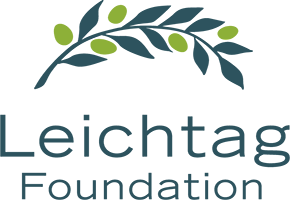






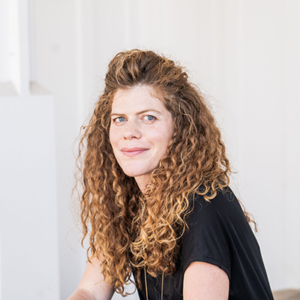
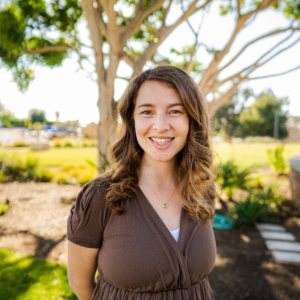

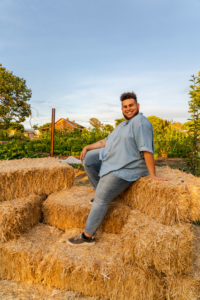 Black, Jewish and Queer. These three identities weave the fabric of who I am, but it took a long time to believe that they could exist together.
Black, Jewish and Queer. These three identities weave the fabric of who I am, but it took a long time to believe that they could exist together.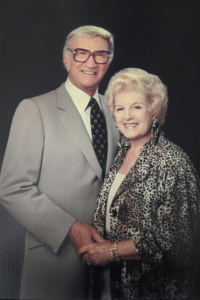 Lee and Toni Leichtag established the Leichtag Foundation in 1991 following the sale of their business. Lee and Toni were lifelong entrepreneurs with a passion for innovation and for supporting talent. They believed that only with big risk comes big reward. Both born to families in poverty, Toni to a single mother, they strongly believed in helping those most in need and most vulnerable in our community. While they supported many causes, their strongest support was for young children and the elderly, two demographics who particularly lack voice in our society.
Lee and Toni Leichtag established the Leichtag Foundation in 1991 following the sale of their business. Lee and Toni were lifelong entrepreneurs with a passion for innovation and for supporting talent. They believed that only with big risk comes big reward. Both born to families in poverty, Toni to a single mother, they strongly believed in helping those most in need and most vulnerable in our community. While they supported many causes, their strongest support was for young children and the elderly, two demographics who particularly lack voice in our society.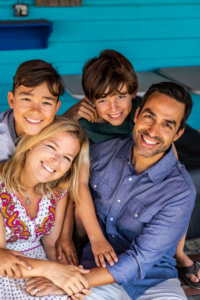 Lifelong Baltimoreans, Rabbi George and Alison Wielechowski and their sons, 11-year-old Lennon and 9-year-old Gideon, are more than pursuing the good life in Southern California. Having moved to San Diego more than three years ago, they are fulfilling a lifelong dream.
Lifelong Baltimoreans, Rabbi George and Alison Wielechowski and their sons, 11-year-old Lennon and 9-year-old Gideon, are more than pursuing the good life in Southern California. Having moved to San Diego more than three years ago, they are fulfilling a lifelong dream.
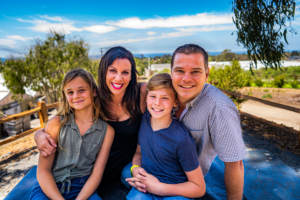
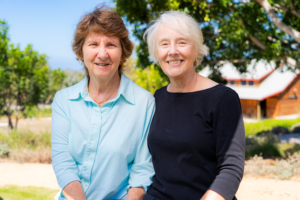

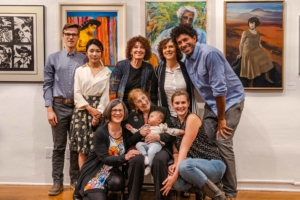
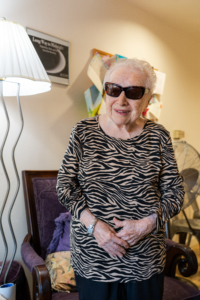
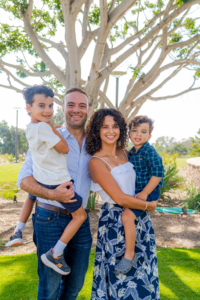
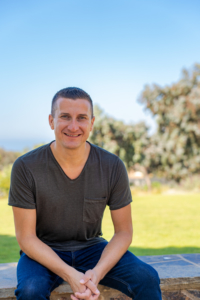 You would think that as the executive director of San Diego LGBT Pride, Fernando Zweifach López Jr., who uses the pronoun they, has done all the coming out they possibly can. A queer, non-binary individual who has worked for many years on civil rights issues, López also speaks openly and often about their father’s family, Mexican-American migrant workers who tilled the fields of rural California.
You would think that as the executive director of San Diego LGBT Pride, Fernando Zweifach López Jr., who uses the pronoun they, has done all the coming out they possibly can. A queer, non-binary individual who has worked for many years on civil rights issues, López also speaks openly and often about their father’s family, Mexican-American migrant workers who tilled the fields of rural California.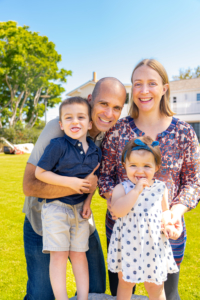 Stacie and Jeff Cook understand commitment. They live it.
Stacie and Jeff Cook understand commitment. They live it.